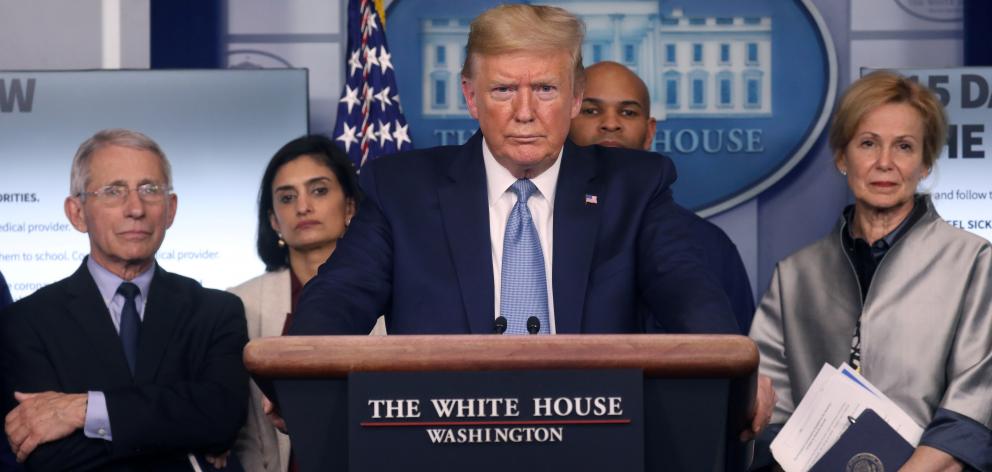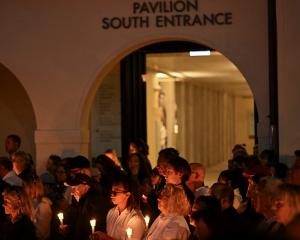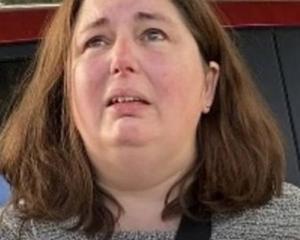
With the number of reported US cases of the respiratory illness surging past 5200 and deaths approaching 100, millions of Americans hunkered down in their homes instead of commuting to work or school as New York and other major cities escalated "social distancing" policies by closing schools, bars, restaurants and theatres.
Vice President Mike Pence, at a news conference with President Donald Trump, said the White House was preparing for possibly having the US military establish field hospitals in virus hot zones if requested by state governors, or using the Army Corp of Engineers to add capacity to existing hospitals.
That follows a call by New York Governor Andrew Cuomo for such steps on Monday.
In one of the most restrictive policies to date, officials in six San Francisco Bay Area counties ordered residents to stay home beginning on Tuesday for all but the most crucial outings until April 7. The order applies to some 6.7 million people.
"It's like living in a 'Twilight Zone.' It's crazy. Just a week ago things were so different. You can feel the anxiety in the air," said Rowan Oake (36) during a jog through San Francisco's Presidio Park.
New York, Washington state and California have the most confirmed cases.
Sounding optimistic, Trump predicted the hard-hit US economy would "come roaring back" when the coronavirus spread slows and that progress is being made against the pathogen.
"It's going to pop," Trump, who is seeking re-election on Nov. 3, said of the economy.
His administration was seeking $US850 billion for a stimulus package, according to a US government official who spoke on condition of anonymity. The package would include $US50 billion for airlines - hard hit by the pandemic - and $US250 billion for small business loans.
"We're going big," Trump said, describing the health crisis as a war against an "invisible enemy."
US Treasury Secretary Steven Mnuchin said the current crisis has been even worse for the airline industry than the aftermath of the September 11, 2001, attacks.
Trump, surrounded by top advisers on the coronavirus crisis at the White House briefing room, said his administration was considering a plan to send checks to individual Americans of $US1000 to help them weather the crisis, though he indicated details needed to be worked out.
Mnuchin said checks could be sent within the next two weeks, noting that many companies have shut down, including bars and restaurants.
"Americans need cash now," Mnuchin said, adding that there would be some sort of an income restriction. "I think it's clear. We don't need to send people who make a million dollars a year checks."
Mnuchin said he would meet with lawmakers to discuss the stimulus plan on Tuesday and that he was expecting bipartisan support.
The Senate later in the day was prepared to take up a multibillion-dollar emergency spending bill passed by the House of Representatives on Saturday that would require paid sick leave for workers, expand unemployment compensation and provide nearly $US1 billion in additional money to help feed children, homebound senior citizens and others during the outbreak.
Wall Street rebounded on Tuesday following its steepest declines since the 1987 crash, as the Federal Reserve took more steps to boost liquidity in a market sapped by business and travel disruptions due to the pandemic.
The benchmark S&P 500 was up nearly 5% after the central bank relaunched a financial crisis-era purchase of short-term corporate debt.
Mnuchin said it may get to a point where shortening market trading hours would be needed, but that the intention is to keep markets open.
TRAVEL RESTRICTIONS
Trump urged Americans not to travel and said travel restrictions within the United States are being considered.
"You can do a national lockdown. Hopefully, we're not going to need that," Trump said. "It's a very big step."
Trump also asked Americans not to hoard supplies and to "buy less" when they go to stores.
The coronavirus threat has shaken the airline industry and other economic sectors and has left an increasing number of Americans unemployed.
"We're asking our older generation to stay in their homes. ... We're asking the younger generation to stop going out," said Trump coronavirus adviser Deborah Birx.
It was St. Patrick's Day but the mood was sober, not joyous, after traditional parades and parties celebrating the Irish heritage of many Americans were canceled across the country and usually crowded pubs were shuttered. Florida's governor said bars and nightclubs in his state would close for 30 days.
Voters in Florida, Illinois and Arizona were met by gloved poll workers and hand sanitiser as they cast ballots on Tuesday in the state-by-state process of selecting a Democratic challenger to Trump in the November 3 US election.
Former Vice President Joe Biden looked to bolster his dominant lead over rival Senator Bernie Sanders. Ohio officials cancelled that state's primary due to coronavirus fears hours before voting was to begin.
After previously downplaying the danger and declaring the situation under control, the White House urged Americans on Monday to avoid gatherings of more than 10 people and called for closing bars, restaurants and other venues in states where local virus transmission exists.
About half of US blood centre are reporting low inventory and the country could see shortages in about two weeks as blood drives are cancelled due to the outbreak, according to a national blood bank association.













